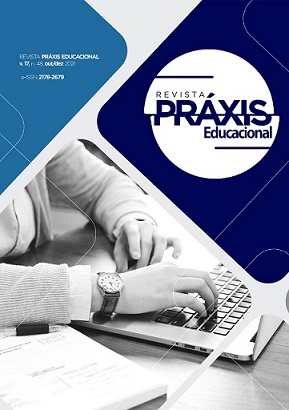Research on natural sciences in the common national curricular base: a recent map
DOI:
https://doi.org/10.22481/praxisedu.v17i48.8757Keywords:
Common National Curricular Base, Nature Sciences, ResearchAbstract
The article presents the results of a mapping of scientific articles that focus on the area of Nature Sciences in the BNCC in the data base of the Periodical Portal of the Coordination of Higher Level Personnel (CAPES) and of Google Academic, in the period from 2017 to 2021 (first quarter). This is a qualitative research, characterized as an inventory and descriptive balance. In the searches, 927 scientific articles were found on the BNCC after using the filters and, of this number, only 38 of them focused on Nature Science. The balance of these productions indicates a still emerging and growing debate, tensioned by different views and perspectives on the BNCC, a movement, in fact, peculiar to studies in the field of curriculum policy. Although the articles address the same area of knowledge, they delve into different issues, highlighting themes related to practice, science education, health, and the structuring elements of the BNCC text in the different versions. The articles that analyzed the construction process and the different versions of the BNCC present as points of convergence the perception that the approved version of this official document has a structure that goes against what is expected, by scholars in the field, of a science education.
Downloads
Metrics
References
AGUIAR, Márcia Angela; DOURADO, Luiz Fernandes (Orgs.). A BNCC na contramão do PNE 2014-2024: avaliação e perspectivas (livro eletrônico). Recife: ANPAE, 2018.
APPLE, Michael Whitman. A política do conhecimento oficial: faz sentido a ideia de um currículo nacional? In: MOREIRA, Antônio Flávio Barbosa; SILVA, Tomaz Tadeu da. (Orgs.). Currículo, cultura e sociedade. 9. ed. São Paulo: Cortez, 2006, p. 59-91.
BALL, Stephen J.; MAGUIRE, Meg; BRAUN, Annette. Como as escolas fazem as políticas: atuação em escolas secundárias. Ponta Grossa: Editora UEPG, 2016, 230p.
BRASIL. Coordenadoria de Aperfeiçoamento de pessoal de Nível Superior. Cursos avaliados e reconhecidos. 2021. Disponível em: <https://sucupira.capes.gov.br/sucupira/public/index.xhtml>. Acesso em: 01mar. 2021.
BRASIL. Resolução CNE/CP Nº 2, de 22 de dezembro de 2017. Institui e orienta a implantação da Base Nacional Comum Curricular, a ser respeitada obrigatoriamente ao longo das etapas e respectivas modalidades no âmbito da Educação Básica. Brasília, DF, 2017. Disponível em: <http://portal.mec.gov.br/index.php?option=com_docman&view=download&alias=79631-rcp002-17-pdf&category_slug=dezembro-2017-pdf&Itemid=30192>. Acesso em: 02 mar 2021.
______. Ministério da Educação. Base Nacional Comum Curricular. Versão final. Brasília, DF, 2018. Disponível em: <http://basenacionalcomum.mec.gov.br/images/BNCC_EI_EF_110518_versaofinal_site.pdf>. Acesso em: 22 fev. 2021.
CURY, Carlos Roberto Jamil; REIS, Magali; ZANARDI, Teodoro Adriano Costa. BaseNacional Comum Curricular: dilemas e perspectivas. São Paulo: Cortez, 2018, 144p.
DENZIN, Norman K.; LINCOLN, Yvonna S. O planejamento da pesquisa qualitativa: teorias e abordagens. 2. ed. Porto Alegra: Artmed, 2006, 432p.
FARIAS, Isabel Maria Sabino de; CASTRO, Francisco Mirtiel Frankson Moura; VEIGA, Ilma Passos. Que caminho seguir? Apontamentos sobre os objetivos educacionais no contexto da Educação Superior. In: VEIGA, Ilma Passos; FERNANDES, Rosana César de Arruda (Orgs.). Por uma Didática da Educação Superior. Campinas, São Paulo: Editora Autores Associados, 2020, p.79-100.
FARIAS, Isabel Maria Sabino de; GUIMARÃES, Marília Duarte; MOURA, Ingrid Louback de Castro. Grupos de pesquisa que investigam a formação de professores no Nordeste: quem são, o que produzem e como produzem. Revista Práxis Educacional, Vitória da Conquista – Bahia – Brasil, v. 16, n. 43, p. 297-318, Edição Especial, 2020.
FERREIRA, Norma Sandra de Almeida. As pesquisas denominadas “estado da arte”. Educação & Sociedade, n.79, p. 257-272, ago. 2002. Disponível em: <https://www.scielo.br/pdf/es/v23n79/10857.pdf >. Acesso em: 23 fev. 2021.
LOPES, Alice Casimiro. Políticas curriculares: continuidade ou mudança de rumos?.Revista Brasileira de Educação, n. 26, p. 109-118, mai./jun./jul./ago. 2004. Disponível em: <https://www.scielo.br/pdf/rbedu/n26/n26a08.pdf>. Acesso em: 02 fev. 2021.
MACEDO, Elizabeth. “A base é a base”. E o currículo o que é?. In: AGUIAR, Márcia Angela; DOURADO, Luiz Fernandes (Orgs.). A BNCC na contramão do PNE 2014-2024: avaliação e perspectivas (livro eletrônico). Recife: ANPAE, 2018, p. 28-33.
MATOS, Kalma Socorro Lopes de; VIEIRA, Sofia Lerche. Pesquisa Educacional: o prazer de conhecer. Fortaleza: Edições Demócrito Rocha; UECE, 2001, 143p.
MINAYO, Maria Cecília de Souza (Org.). 34ª Ed. Pesquisa social: teoria, método e criatividade. 28ª. ed. Petrópolis: Vozes, 2015, 112p.
ROLDÃO, Maria do Céu; ANDRÉ, Marli Eliza Damalzo; BRZEZINSKI, Íria; ROMANOWSKI, Joana Paulin; LIMA, Edileuza. III Simpósio de Grupos de Pesquisa sobre Formação de Professores do Brasil – Síntese das observações realizadas. Revista Formação Docente, Belo Horizonte, v. 10, nº 18, p.11-18, jan./jul. 2018.
SILVA, Silvina Pimentel; NÓBREGA-THERRIEN, Silvia Maria; FARIAS, Isabel Maria Sabino de. Produções sobre a formação de professores no EPENN: análise do período 2003 a 2011. In: GOMES, Alfredo Macedo; LEAL, Telma Ferraz. Pesquisas em Educação nas regiões Norte e Nordeste: balanço e perspectivas. Recife: editora UFPE, 2014, p.127-152.
STAKE, Robert E. Pesquisa Qualitativa: estudando como as coisas funcionam. Porto Alegre: Penso, 2011, 263p.
Downloads
Published
How to Cite
Issue
Section
License
Copyright (c) 2021 Práxis Educacional

This work is licensed under a Creative Commons Attribution-ShareAlike 4.0 International License.
You are free to:
Share - copy and redistribute the material in any medium or format; Adapt - remix, transform, and build from the material for any purpose, even commercially. This license is acceptable for Free Cultural Works. The licensor cannot revoke these freedoms as long as you follow the terms of the license.
Under the following terms:
Attribution - You must appropriately give credit, provide a link to the license, and indicate if any changes have been made. You may do so in any reasonable way, but not in a way that suggests that you or your use is endorsed by the licensor.
There are no additional restrictions - You cannot apply legal terms or technological measures that legally restrict others to make any use permitted by the license.










